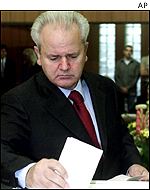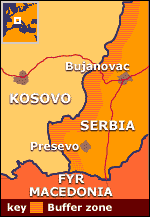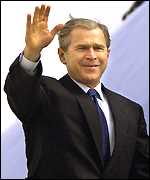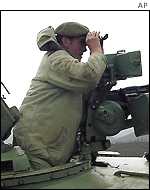Enter content here Albanian demostrators burn portaits of Russian Foreign Minister Igor Ivanov in Tirana March 21, 2001. A few hundred people protested in support of the UCK (National Liberation Army) of ethnic Albanians in Macedonia. Ivanov is on one day official visit to Albania to discuss with Albanian authorities the situation in Macedonia and Balkan region. REUTERS/Arben Celi Albanian rebels are fighting to protect mafia interests: expert. AFP Wednesday March 21, 11:06 PM
Albanian rebels are fighting to protect mafia interests: expert
PARIS, March 21 (AFP) -
A leading criminologist said Wednesday that the rebels fighting in the hills of Macedonia and southern Serbia are the paramilitary wing of an Albanian mafia exporting drugs and trafficking in humans to Europe and beyond.
"Every mafia needs two things -- a safe home territory, and a diaspora. The Albanians now have the diaspora through the refugees from the Kosovo war. Their home base is in these areas," said Xavier Raufer, a researcher at the Paris Institute of Criminology and author of "The Albanian Mafia."
The guerrillas stated aim is to protect the ethnic Albanian minority in Macedonia, which they claim is oppressed by the Slavic majority, and although their latest offensive has been condemned around the world, international bodies have called on Skopje to do more to ensure equal rights.
But Raufer saids that since NATO and the United Nations took over Kosovo it has become a lawless paradise for organised crime, and the latest guerrilla offensives on the margins of the province are a fight to control two key points on a smuggling route dubbed the "Balkans Golden Triangle".
Guerrillas based in a demilitarised zone on the Kosovo border last year seized control of the southern Serbian town of Veliki Trnovac, which experts regard as a key depot on the route bringing heroin and immigrants from Turkey and central Asia into Europe.
The rebel-held town, which Raufer describes as a Balkan "Medellin", a reference to the centre of Colombia's most notorious drugs cartel, is a prosperous settlement connected to Kosovo by forest tracks.
In January, armed rebels in the uniform of the Liberation Army of Presevo, Medvedja and Bujanovac (LAPMB) were seen guarding the route and teams of civilian workmen were maintaining the forest roads.
Mercedes saloons and four-wheel-drive trucks kept a constant stream of traffic over the border and in a Kosovar village on the other side a taxi rank was kept busy by the flow of passengers and produce back and forth.
The rigorously enforced honour code of the Albanian clans -- the so-called "besa" -- is as strong an incentive to keep quiet as the Mafia's law of omerta but some Albanian Kosovars privately admit that Veliki Trnovac is a drug smuggling centre.
And one western intelligence expert, who requested anonymity, said of the town: "It is always one of the points marked in red in maps of the international drug routes."
For Raufer there is no question that much of the motivation for the rebel offensive was to secure control of the route to ease smuggling operations.
He said Italy's police intelligence service regard the LAPMB, the Kosovo Liberation Army (KLA) and Macedonia's National Liberation Army (NLA), as linked to a criminal conspiracy of Balkan clan-chiefs, gangsters in the diaspora and former members of the Albanian secret service, the SHIK.
Raufer said Tetovo, the northeast Macedonian town whch is the scene of the latest fighting, is the power-base of a wealthy Kosovar Albanian identified by NATO as one of the leading crime figures.
"The guerrillas want to drive the police and the army from this territory to give them a free hand to pursue their business interests," he said.
Principally these interests involve smuggling of drugs and of people, both illegal immigrants and kidnapped sex-slaves, most of which end up being passed across the Albanian-speaking area of the Balkans to the Adriatic ports of Vlore and Durres, and thence to Italy where the gangs have alliances with the original mafia.
A British police officer told the BBC this week that thousands of women were arriving in Britain to work as prostitutes for Albanian pimps, a problem which has been reported by officials in Italy, France, Germany and Scandinavia.
Figures collected for Raucher's book suggest that up to 70 percent of the heroin consumed in Switzerland, Austria and Germany has been brought in by Albanian gangs, who are also active in burglary and money-laundering. Cook condemns Balkan's terrorists.
BBC Robin Cook called for "robust" action to tackle rebels Wednesday, 21 March, 2001, 13:07 GMT
UK Foreign Secretary Robin Cook said efforts must be stepped-up to seal the Macedonia-Kosovo border, where ethnic Albanian "terrorists" were threatening to spark a crisis in the Balkans.
Mr Cook told BBC Radio 4's Today programme that he had discussed the situation in the Macedonian border town of Tetovo with US Secretary of State Colin Powell and several European foreign ministers.
Ethnic Albanian guerrillas known as the National Liberation Army (NLA) have called for a new Macedonian constitution, better rights for Albanians, and international mediation.
The Macedonian Government has given the rebels until midnight to surrender or withdraw from Macedonian territory, otherwise it says it will use all available means against them.
Mr Cook said: "We all agreed that K-For [Nato-led peacekeeping force] must show a robust and rapid response by stepping up its patrols on the border, on the ground and in the air."
K-For should also step up efforts to share intelligence information with the Macedonian army "to make sure that we together defeat the terrorists' attempts to move across the border," Mr Cook added.
Legitimate demands
The conflict in the former Yugoslav republic has escalated in recent weeks leaving up to 10,000 people displaced from their homes.
Mr Cook said the UK wanted to work with the Macedonian government to defeat the rebels.
But as well as a "robust" military response, he said the Macedonian Government needed to respond to "legitimate political demands of the Albanian community".
Mr Cook dismissed the suggestion that K-For should take direct action against the rebels in Macedonia.
But he said the Macedonian Government was a democratic authority, "not a repressive regime" and included representatives of an Albanian party.
Ethnic Albanians make up a quarter of Macedonia's population.
Mr Cook said Britain had shown its support in the past by putting £500,000 into an Albanian University in Tetovo. Ethnic Albanians face war crimes probes. BBC Attacks on Serbs include February's bus bombing in Kosovo. Wednesday, 21 March, 2001, 17:03 GMT
Ethnic Albanians are under investigation by United Nations war crimes prosecutors over alleged abuses of Serbs, it has been revealed.
UN chief prosecutor Carla del Ponte said two inquiries were already under way - one into alleged crimes in Kosovo, the other into attacks by a rebel group fighting outside Kosovo's borders in southern Serbia.
A separate inquiry into the activities of the Kosovo Liberation Army had already been announced last year. Carla del Ponte: Progress in talks in Belgrade. UN prosecutors will look into allegations of crimes committed against Serbs and other minorities following the expulsion by Nato of the Yugoslav army and Serb paramilitaries from Kosovo in June 1999.
The announcement comes amid expressions of optimism from UN war crimes officials about future co-operation with the Yugoslav authorities and more suspects being handed over by Belgrade.
A list of potential witnesses for the new investigations - complete with their telephone numbers - has been handed to the UN by justice ministers of Serbia and Yugoslavia.
Ms del Ponte said Kosovo had been classified as an area of international conflict from the date of Nato's intervention, which meant the Geneva Convention's rules of war applied, and the tribunal had jurisdiction.
Presevo rebels
The second inquiry will look at the activities of the ethnic Albanian rebel group fighting in southern Serbia - the Liberation Army of Presevo, Medvedja and Bujanovac (UCPMB).  Milosevic: Prosecutors want him extradited. Ethnic Albanian rebels in and around Kosovo have been blamed for a number of attacks on Serb civilians, including the bombing in February of a Serb bus convoy in Kosovo, in which at least 10 people were killed.
The two new inquiries were announced at a news conference held with the Yugoslav Justice Minister, Momcilo Grubac and the Serb Justice Minister, Vladan Batic, who are on a two-day visit to The Hague.
Ms del Ponte, who is still seeking the extradition of some of the most significant war crimes suspects, including ex-Yugoslav President Slobodan Milosevic, said her meetings with the delegation had been "most fruitful".
"Serious work has been done in Belgrade on the draft law for the implementation of co-operation," she said. The Kosovo legacy. BBC US troops are stepping up controls near the border Wednesday, 21 March, 2001, 14:43 GMT
By Jonathan Eyal
Theoretically, the armed incidents of the past few months - when Albanian fighters were responsible for a rising level of violence in Serbia's Presevo valley, in northern Kosovo, and in north-western Macedonia - are unrelated.  Ethnic Albanian rebels want Kosovo status clarified
In practice, however, all these incidents are the product of the same sense of frustration among ethnic Albanians about their nebulous legal status, coupled with their growing fear that, for the third time in a century, the West is about to sacrifice their interests in order to accommodate the Serbs.
Nato's military intervention in Kosovo was and remains contradictory.
The Alliance repeatedly claimed that it was not fighting on behalf of the Albanians, despite the fact that the only beneficiaries of the 1999 operation were the Albanians.
Nato loudly condemned Albanian terrorism but somehow managed to bomb only Yugoslav military targets.
The war was also supposed to protect the multi-ethnic character of Kosovo, but Nato was ultimately unable to prevent the exodus of hundreds of thousands of ethnic Serbs and Roma from the province.
Finally, the Alliance remained committed to the maintenance of Yugoslav sovereignty over Kosovo, although no Western leader ever specified how the province could ever be returned to Belgrade's rule if the majority of its population remained against this idea.
The ethnic Albanians of the province were initially unperturbed by such contradictions.
But they did not reckon with two surprises - a political change in Belgrade, their main enemy, accompanied by one in Washington, hitherto their chief ally.
The overthrow of Slobodan Milosevic's regime in Yugoslavia allowed the West to normalise relations with the country; the return of Kosovo to Yugoslav sovereignty, until recently just a theoretical question, suddenly looked perfectly possible.  The change in Washington came as a surprise
And the election of a new US administration, ostensibly committed to a withdrawal of US troops from Kosovo, merely added to the Albanians' sense of unease.
Despite the Western rush to re-establish relations with Belgrade, the idea that Kosovo will be forced to return to Yugoslav control remains far-fetched.
And statements by President Bush's close advisers, suggesting the imminent withdrawal of US troops from the province, should not be taken too seriously either.
This is the political background to the current wave of violence.
But, instead of bending to these pressures, Nato has decided to teach the Albanian guerrillas a lesson - that they cannot achieve border changes through terrorist attacks.
Nato's quandary
Although the moves carry high risks, they also provide new political opportunities.
Vulnerable and poor, Macedonia's independence was contested by many of the country's neighbours.  The Yugoslav military is co-operating with Nato
The Greeks, who originally refused to recognise the republic, are now among Macedonia's biggest supporters.
And the Bulgarians, who had their own historic disputes with Macedonia, are also offering support.
Just as significantly, the relationship between Yugoslavia and the West have been revamped as a result of this confrontation.
The Yugoslav military is yet again co-operating with Nato, while the government in Belgrade has put forward sensible political proposals for the autonomy of its ethnic Albanians.
In the long run, however, Nato remains in a bind.
Even if Western governments were willing to grant Kosovo its independence, this would require a change in the terms of the UN mandate, something which both the Russians and the Chinese are sure to veto.
Nor can Nato contemplate withdrawal from the region.
So the Alliance is stuck in an unwinnable position, seeking to defend the Albanians' entitlement to govern themselves, but denying them the right to be completely self-governing.
The current crisis is containable. But the reasons for the Albanians' frustrations will remain, and will fuel further violence.
Jonathan Eyal is Director of Studies at the Royal United Services Institute, London. |



